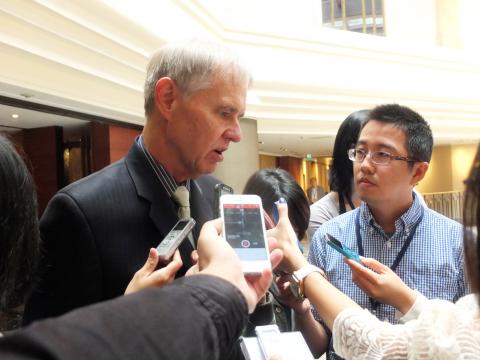Cross-strait relations need to enter a phase of incremental and reciprocal progression in which both sides of the Taiwan Strait build up mutual trust rather than Beijing’s unilateral and endless demands for President Tsai Ing-wen’s (蔡英文) administration to offer guarantees of its good will, said Richard Bush, director of the Center for Northeast Asian Policy Studies at the Brookings Institution think tank in Washington.
In an e-mail interview with the Chinese-language Liberty Times (the Taipei Times’ sister newspaper) on Tuesday, the former American Institute in Taiwan chairman said that after carefully reading the six-point statement issued by Chinese President Xi Jinping’s (習近平) government following his meeting with Chinese Nationalist Party (KMT) Chairwoman Hung Hsiu-chu (洪秀柱), it is clearly a statement of Beijing’s policy on cross-strait relations.
While Beijing maintains its stance that it requires the Tsai administration’s guarantee of good will, Taiwan has reason to mistrust Beijing’s intentions, he said.

Photo: Tsao Po-yen, Taipei Times
Xi’s “six-point statement” includes adherence to the so-called “1992 consensus” which reflected the “one China” principle; the adamant opposition to “pro-Taiwanese independence” separatists and their activities; the promotion of an increasingly integrated cross-strait economy and society; the joint promotion of Chinese culture; joint efforts to ensure the happiness of people on both sides of the Strait; and a joint effort to make the Chinese race great once more.
The “1992 consensus,” a term former Mainland Affairs Council chairman Su Chi (蘇起) admitted to making up in 2000, refers to a tacit understanding between the KMT and the Chinese government that both sides of the Taiwan Strait acknowledge there is “one China,” with each side having its own interpretation of what “China” means.
Xi’s comments on Hung’s proposal for a cross-strait peace accord is almost the same as the commentary heard under former Chinese president Jiang Zemin (江澤民) in the early 1990s to the early 2000s, Bush said, adding that had it not been for Hung specifically mentioning the issue, Xi would not have touched the subject.
Bush said he was puzzled as to why Hung would consider the Democratic Progressive Party’s independence platform to have potential danger, since Tsai seems to be focused on practical domestic policy problems.
He was unclear how the KMT’s new peace-centered policy platform could do more to stabilize cross-strait relations.
Bush also added that he did not understand how Hung could improve the KMT’s current predicament in Taiwan through interactions with China, as it could very well cause greater harm to the KMT as Beijing seems to be willing to pick a side when it comes to Taiwan’s internal politics.

The manufacture of the remaining 28 M1A2T Abrams tanks Taiwan purchased from the US has recently been completed, and they are expected to be delivered within the next one to two months, a source said yesterday. The Ministry of National Defense is arranging cargo ships to transport the tanks to Taiwan as soon as possible, said the source, who is familiar with the matter. The estimated arrival time ranges from late this month to early next month, the source said. The 28 Abrams tanks make up the third and final batch of a total of 108 tanks, valued at about NT$40.5 billion

Travel agencies in Taiwan are working to secure alternative flights for travelers bound for New Zealand for the Lunar New Year holiday, as Air New Zealand workers are set to strike next week. The airline said that it has confirmed that the planned industrial action by its international wide-body cabin crew would go ahead on Thursday and Friday next week. While the Auckland-based carrier pledged to take reasonable measures to mitigate the impact of the workers’ strike, an Air New Zealand flight arriving at Taipei from Auckland on Thursday and another flight departing from Taipei for Auckland on Saturday would have to

A group from the Taiwanese Designers in Australia association yesterday represented Taiwan at the Midsumma Pride March in Melbourne. The march, held in the St. Kilda suburb, is the city’s largest LGBTQIA+ parade and the flagship event of the annual Midsumma Festival. It attracted more than 45,000 spectators who supported the 400 groups and 10,000 marchers that participated this year, the association said. Taiwanese Designers said they organized a team to march for Taiwan this year, joining politicians, government agencies, professionals and community organizations in showing support for LGBTQIA+ people and diverse communities. As the first country in Asia to legalize same-sex

MOTIVES QUESTIONED The PLA considers Xi’s policies toward Taiwan to be driven by personal considerations rather than military assessment, the Epoch Times reports Chinese President Xi Jinping’s (習近平) latest purge of the Chinese People’s Liberation Army (PLA) leadership might have been prompted by the military’s opposition to plans of invading Taiwan, the Epoch Times said. The Chinese military opposes waging war against Taiwan by a large consensus, putting it at odds with Xi’s vision, the Falun Gong-affiliated daily said in a report on Thursday, citing anonymous sources with insight into the PLA’s inner workings. The opposition is not the opinion of a few generals, but a widely shared view among the PLA cadre, the Epoch Times cited them as saying. “Chinese forces know full well that